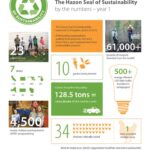October 3rd, 2017 | 13 Tishrei 5778
Dear All,
My family built our sukkah this past Sunday. I felt an uneasy juxtaposition between the joy of this holiday – freely choosing to create and decorate a temporary home in which we will share our abundance with friends – and the cruel fate of so many that now find themselves forced into temporary homes. From Puerto Rico and Florida to India and Nepal, the devastation and destruction from climate change is a new normal. We can’t let ourselves see this as a problem in some other place that someone else needs to fix. This planet is a permanent home – for all of us.
We have estimated that the current carbon footprint of the US Jewish Community is about 86,920,000 metric tons.* As a community with less than 2% of the US population, we have a carbon footprint larger than 119 countries, including Denmark, Israel, Morocco, New Zealand, and Sweden.
In addition to the personal impact that we are making from our lives, the American Jewish Community owns thousands of buildings across the United States. There are roughly 3,500 synagogues in the US, and thousands more day schools, camps, social service agencies, Federations, and community centers.
71% of American Jews believe that stricter environmental laws and regulations are worth the cost (Pew). A growing number of organizations aren’t waiting for laws and regulations. They are taking their own measured steps to reduce their carbon footprint.
In 2016, we launched the Hazon Seal of Sustainability. We recently assessed outcomes from the first year of the Seal, which included 23 organizations. After the initial pilot year, here’s how we’ve managed to make a difference:
- 61,000 lbs of compost was diverted from landfills;
- 10 garden beds were planted;
- Organizations reduced their carbon footprints by 128.5 tons (equal to removing 25 cars from the road for a year);
- 500+ LED light bulbs were installed in synagogues, reducing energy use and saving money;
- 34 chickens are being raised by Jewish organizations, including the first Hillel with a chicken coop; and
- 4,500 Jewish children participated in JOFEE programming.
An additional 22 organizations joined the Seal in spring 2017, and this fall another cohort will start. If you are interested in your organization joining the Seal of Sustainability, please contact rachel.aronson@hazon.org.
We live in a world in which we are all truly bound together – through the air we breathe, the water we drink, the land that holds us, and the sun that gives us life. Our collective choices do have a collective impact on hurricanes, earthquakes, and floods. We hope that the Seal of Sustainability and the work of the participating organizations will be one more step towards building a sustainable world for all.
This Sukkot, as I choose to step out of my home to sit in my temporary home, I will consider the privilege that gives me this choice and the actions that I can take to reduce my own carbon footprint.
Finally, on another personal note, it has been a pleasure to be the acting CEO for the last few months. Nigel will return from his sabbatical in a few weeks and he looks forward to being in touch again.
Chag sameach,
Judith
*This calculation was derived based on the recent Pew Study on Religion in America. There are approximately 5.3 million Jews in the United States, and using the average US carbon footprint of 16.4 metric tons per capita (the most recent World Bank figure from 2013), that footprint is likely a low estimate. 44% of American Jews fall into the highest income bracket (household income over $100,000), the largest proportion of any religious group measured. Households with higher incomes tend to be correlated with a larger carbon footprint: disposable income enables living in bigger buildings, traveling more, and eating more expansive diets. It’s safe to assume that many American Jews may have a carbon footprint considerably larger than 16.4 metric tons. If you have thoughts about our calculation or would like to suggest other data, please contact rachel.aronson@hazon.org.

